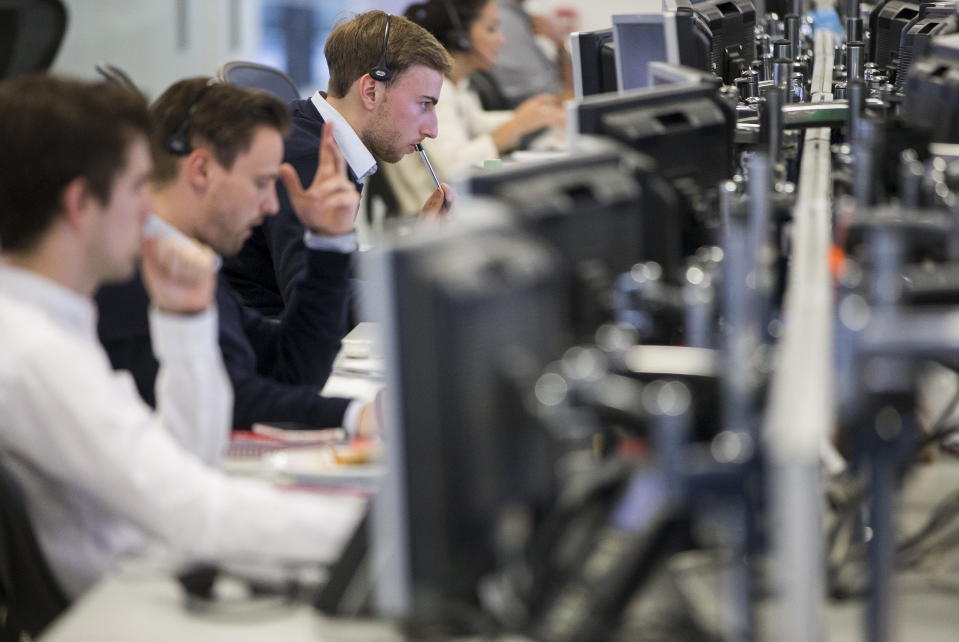Amateur investors chase profits during the pandemic

Barney Durrant’s father worked for British Airways when he was younger. So when the share price of BA’s parent company began tumbling earlier this year, he saw “an opportunity.”
“I felt they would come back reasonably quickly,” Durrant, a self-employed digital marketing consultant from East Grinstead, said of airline stocks. “They were at such a massive low.”
A few weeks into lockdown he signed up to online trading platform Saxo and bought shares in BA’s parent company IAG (IAG.L). He also picked up stock in easyJet (EZJ.L) and a few other bombed out big names such as engine maker Rolls-Royce (RR.L).
Durrant is one of thousands of Brits who have joined trading and investment platforms since the COVID-19 pandemic began. A combination of market volatility, lockdown boredom, and financial interest has lured amateur investors into playing the market — many for the first time.
Read more: Pandemic drives amateur investor trading boom
“It was my mum actually, she uses Freetrade and she started investing a few months ago as well,” Georgia Went, a 22-year-old apprentice from London, told Yahoo Finance UK. “She’s the one who advised me.”
Went used money she’d been saving for a holiday to start investing through stockbroking app Freetrade last month. She has since convinced her boyfriend to sign-up too.
A spokesperson for Freetrade said the app had seen customer numbers grow by 90% since the start of March. Other investment platforms like IG (IGG.L), AJ Bell (AJB.L), and Hargreaves Lansdown (HL.L) have all reported surging customer sign-ups and trading activity.
“People have had time on their hands sitting at home, surplus cash through expenditure going down, and most people’s income [has] not really been hit because of all the support that’s been coming through,” Anthony Morrow, the founder of online financial advice and investment platform OpenMoney, told Yahoo Finance UK.

For many new investors, the stock market crash caused by the pandemic represented an opportunity to invest at the bottom. Well-known companies’ share prices have plummeted and amateur investors don’t expect it to stay that way.
“I chose ones that I figured they’re going to be low for a little bit but I reckon they’re going to bounce back up quite well because [of] their history,” said Izzy Hathaway, a PR from London.
Hathaway started investing after the market crashed in March, backing companies including JD Wetherspoon (JDW.L) and Trainline (TRN.L).
“My biggest earner was ASOS (ASC.L),” she said. “I bought very cheap around the crash and then, obviously because lots of people are shopping from home, their stock went very high, so I managed to do the dream of buying very low, selling very high.”
The boom in retail investment is not just a UK phenomenon. In the US, amateur investors were blamed for an unusual spike in Hertz’s (HTZ) share price in June. The car rental company’s stock rose more than 100% despite the fact it had just declared bankruptcy — a process that should make shares worthless.

For Morrow, Hertz raises fears that many new investors may not fully understand what they’re doing, particularly given poor financial literacy in the UK.
Rights issues could dilute shareholdings, increased leverage could depress share prices or, in the worst case, companies could go into administration and wipe out equity investors altogether. With any equity investment there’s a chance investors could lose all their money.
“Everything we’ve done has been off our own backs, in terms of actually trying to understand what we’re getting into,” Tommy McGroder, who works in customer service at startup bank, told Yahoo Finance UK.
McGroder is Hathaway’s partner and convinced her to start investing on Freetrade during lockdown. He favours the startup’s low cost model, which helps smalltime investors like him set up a portfolio. However, the tradeoff is customers have to do their own due diligence elsewhere.
“If you look at an app like Freetrade, they don’t actually provide any company specific information or anything,” he said. “You can’t do any research on the app.”

Financial literacy is particularly important given that platforms like eToro, Plus500, and IG don’t just offer investors the opportunity to buy stocks but also push risky derivatives, which customers often trade using borrowed money.
A popular form of derivative marketed to amateur investors in the UK is the contract for difference (CFD)— risky bets on short-term share price moves. A review of the market in 2016 found 82% of investors lost money on CFDs. The regulator ultimately imposed stricter caps on the market to protect consumers but risks remain.
“As soon as any of my search history became anything remotely to do with stocks and shares, I’ve been followed around the internet everywhere by advertisements for CFD companies,” McGroder said.
Last month CFD provider Plus500, which operates across the UK, Europe, Asia, and Canada, said it signed up over 115,000 new customers between April and June — four times as many as the same period in 2019. Revenue in the first six months of the year was up 280% to half a billion dollars.
“I cannot for the life of me see a situation where a pure retail investor would ever benefit from investing in a contract for difference,” Morrow said.
In the US, the dark side of the retail investment boom has been highlighted by the death of Alex Kearns. The 20-year-old died by apparent suicide after wracking up what he believed were losses of $750,000 trading complex options on Robinhood. In a note left to his family, he said he had “no clue about what I was doing” according to the Financial Times.
The case has led to increased scrutiny from US lawmakers of Robinhood, a wildly popular free trading app in the US with over 13 million customers. Last week Robinhood pulled plans to launch in the UK, instead pledging to improve its apps in the US.

“A lot of these services are built around the premise that they are making investing affordable and easy for everyone,” Morrow said. “Just because you make something available and simple and affordable doesn’t make it suitable.”
As well as low barriers to entry, Morrow has concerns that some newer investment businesses could be encouraging unhealthy investment habits.
“They use the same gamification and UX strategies that online gambling apps do,” he said. “People are probably viewing it as it’s slightly more interesting than betting on the horses, which is no longer happening.”
“I can see how it gets addictive,” McGroder said, recalling how frequently he checks the app to see how his shares have moved. “It has been quite tempting, if you do see a small downturn, to funnel more money into it.”
McGroder has so far resisted the temptation and sees himself as a long-term investor rather than a day trader.
However, day trading appears to be on the rise, as signified by the attention given to the self-styled king of day traders Dave Portnoy.
American Portnoy is the founder of sports website Barstool Sports. As professional sports stopped around the world, Portnoy pivoted to giving day trading advice on Twitter to 1.6 million followers.
Portnoy recently made an investment based on a randomly picked Scrabble tile and has compared the stock market to Monopoly. He frequently claims in tweets that stocks only go up. Arguably nobody typifies the fine line between gambling and investing more than him.

“You’re going to see people who are going to have invested in the last 12 months who are going to sat on losses,” Morrow said. “There could be some people who really lucked out, but if you’ve done that through backing individual stocks then you’re not a million miles away from gambling.
“I think there needs to be much stronger regulation about the appropriateness of people who [trade online]. The sign up has to recognise people’s understanding, people’s financial position.”
OpenMoney tells over 80% of new customers to avoid stocks and instead focus on paying down debts and saving cash, Morrow said.
The average household has debts of over £9,000 according to official stats and a report by OpenMoney earlier this year found 1 in 5 Brits had no access to savings.
Many companies are aware of their duty of care to new customers. In an investor update in May, online stockbroker Hargreaves Lansdown said many of its new customers were “relatively new to investing” and promised to “focus on how we can support them”.
A spokesperson for Freetrade said it takes “very seriously our duty to inform our customers about the risks associated with investing” and was “building educational content directly into our app”.
“Anything that gets people engaged is good,” Morrow said. “I just think there needs to be more checks and balances.”
For his part, Durrant said he has not invested “a huge amount” and is “just looking to hold on to [his stocks] for a year, 18-months, something like that.”
“Some of them have already gone up quite a bit,” he noted.
British Airways is among his winning bets.
Listen to the latest podcast from Yahoo Finance UK

 Yahoo Movies
Yahoo Movies 
